A sample of an ideal gas is taken through the cyclic process abca . It absorbs 50 J of heat during the part ab, no heat during bc and rejects 70 J of heat during ca. 40 J of work is done on the gas during the part bc.(a) find the internal energy of the gas at b and c if it is 1500 J at a. (b) calculate the work done by the gas during the part ca.
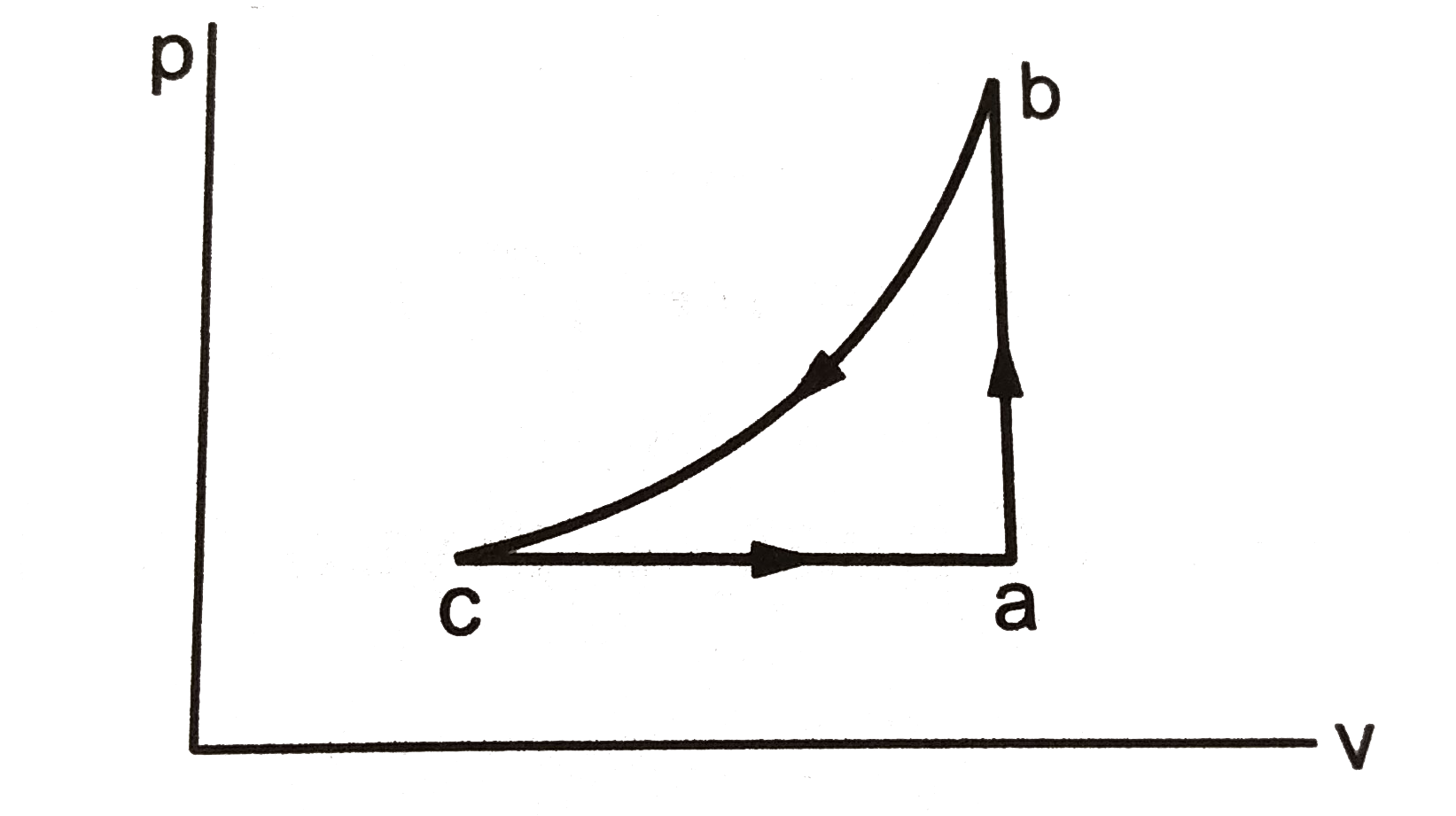 Solution in Tamil
Solution in Tamil
(a) In the part ab the volume remains constant. Thus, the work done by the gas is zero. The heat absorbed by the gas is 50 J. the increase in internal energy from a to b is ΔU=ΔQ=50J.
As the internal energy is 1500 J at a, it will be 1550 J at b. in the part bc, the work done by the gas is ΔW=−40J and no heat is given to the system. the increse in internal energy from b to c is
ΔU=−ΔW=40J. (b) The change in internal energy from c to a is
ΔU=1500J−1590J=−90J.
The heat given to the system is ΔQ=70J.
Using ΔQ=ΔU+ΔW,
ΔW=ΔQ−ΔU
=−70J+90J=20J.
Topper's Solved these Questions
- LAWS OF THERMODYNAMICSBOOK - HC VERMACHAPTER - LAWS OF THERMODYNAMICSEXERCISE - Objective I
9 Videos
- LAWS OF THERMODYNAMICSBOOK - HC VERMACHAPTER - LAWS OF THERMODYNAMICSEXERCISE - Objective II
5 Videos
- LAWS OF THERMODYNAMICSBOOK - HC VERMACHAPTER - LAWS OF THERMODYNAMICSEXERCISE - Short Answer
14 Videos
- KINETIC THEORY OF GASESBOOK - HC VERMACHAPTER - KINETIC THEORY OF GASESEXERCISE - All Questions
120 Videos
- NEWTON'S LAWS OF MOTIONBOOK - HC VERMACHAPTER - NEWTON'S LAWS OF MOTIONEXERCISE - Exercises
42 Videos
Similar Questions
The first law of theromodynamics is a statement of
View SolutionThe pressure p and volume V of an ideal gas both increase in a process.
View SolutionShould the internal energy of a system necessarily increase if heat is added to it?
View SolutionCalculate the rms speed of nitrogen at STP (pressure =1 atm and temperature =00C. The density of nitrgoen in these conditions is 1.25kgm−3
View SolutionA block of mass 2 kg placed on a long frictionless horizontal table is pulled horizontally by a constant foerce F. It is found to move 10 m in the first two seconds. Find the magnitude of F.
View SolutionConsider the cyclic process ABCA, shown in, performed on a sample of 2.0 mol if an ideal gas. A total of 1200 J if heat is withdrawn from the sample in the process. Find the work done by the gas during the part BC.
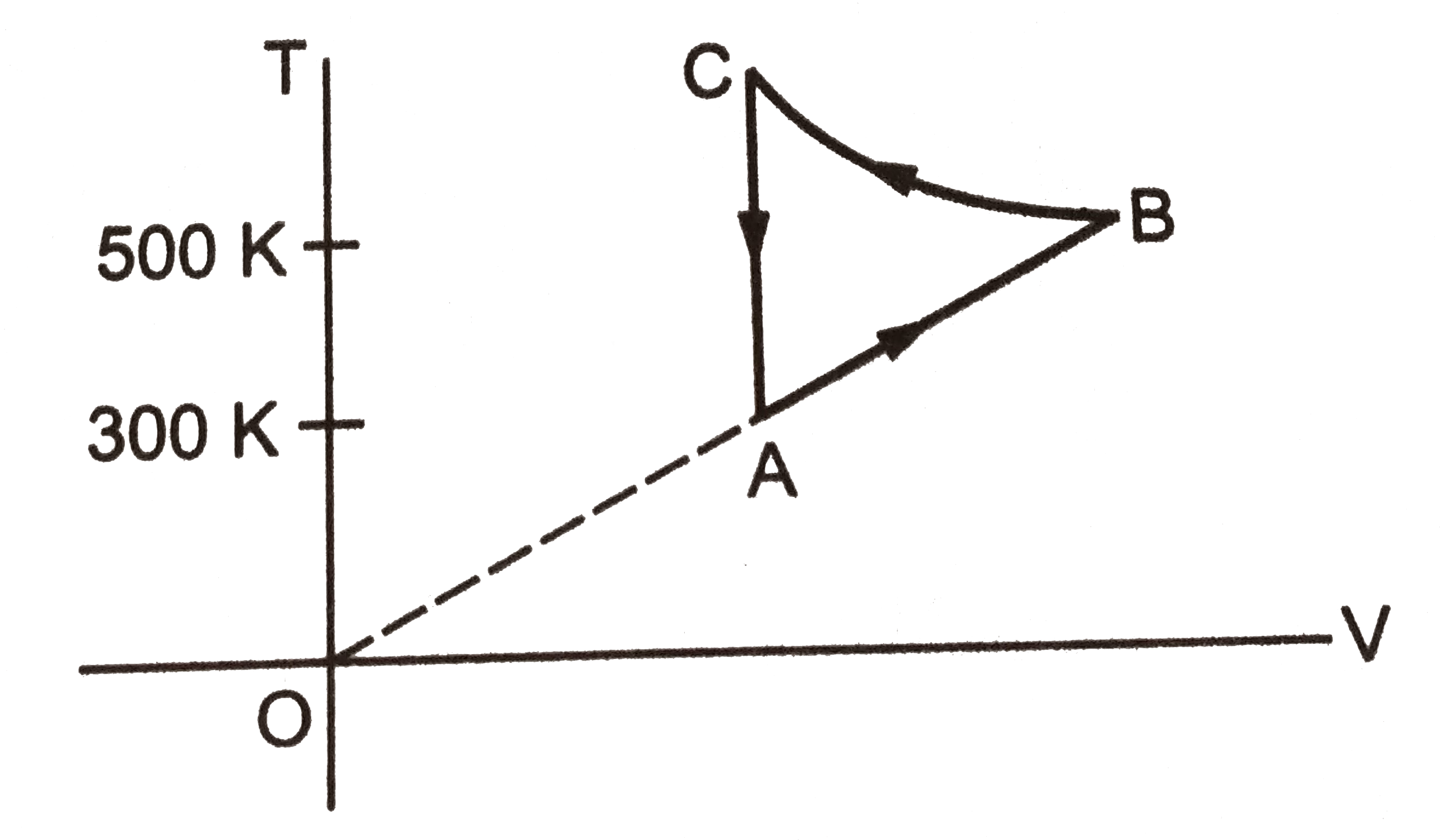
View SolutionAn ideal gas is taken round a cyclci thermodynamic process ABCA as shown if Fig. If the internal energy of the gas at point A is assumed zero while at B it is 50 J. The heat absorbed by the gas in the process BC is 90 J. (a) What is the internal energy og the gas at point C ? (b) How much heat energy is absorbed by the gas in the process AB? (c ) Find the heat energy rejected or absorbed by the gas in the process CA. (d) What is the net work done by the gas in the complete cycle ABCA ?
View SolutionA sample of an ideal gas is taken through the cyclic-process ABCA shown in Fig. It rejects 50J of heat during the part AB, doens not absorb or reject the heat during BC, and accepts 70J of heat during CA. Forty joules of works is done on the gas during the part BC. The internla energies at B and C, respectively, will be
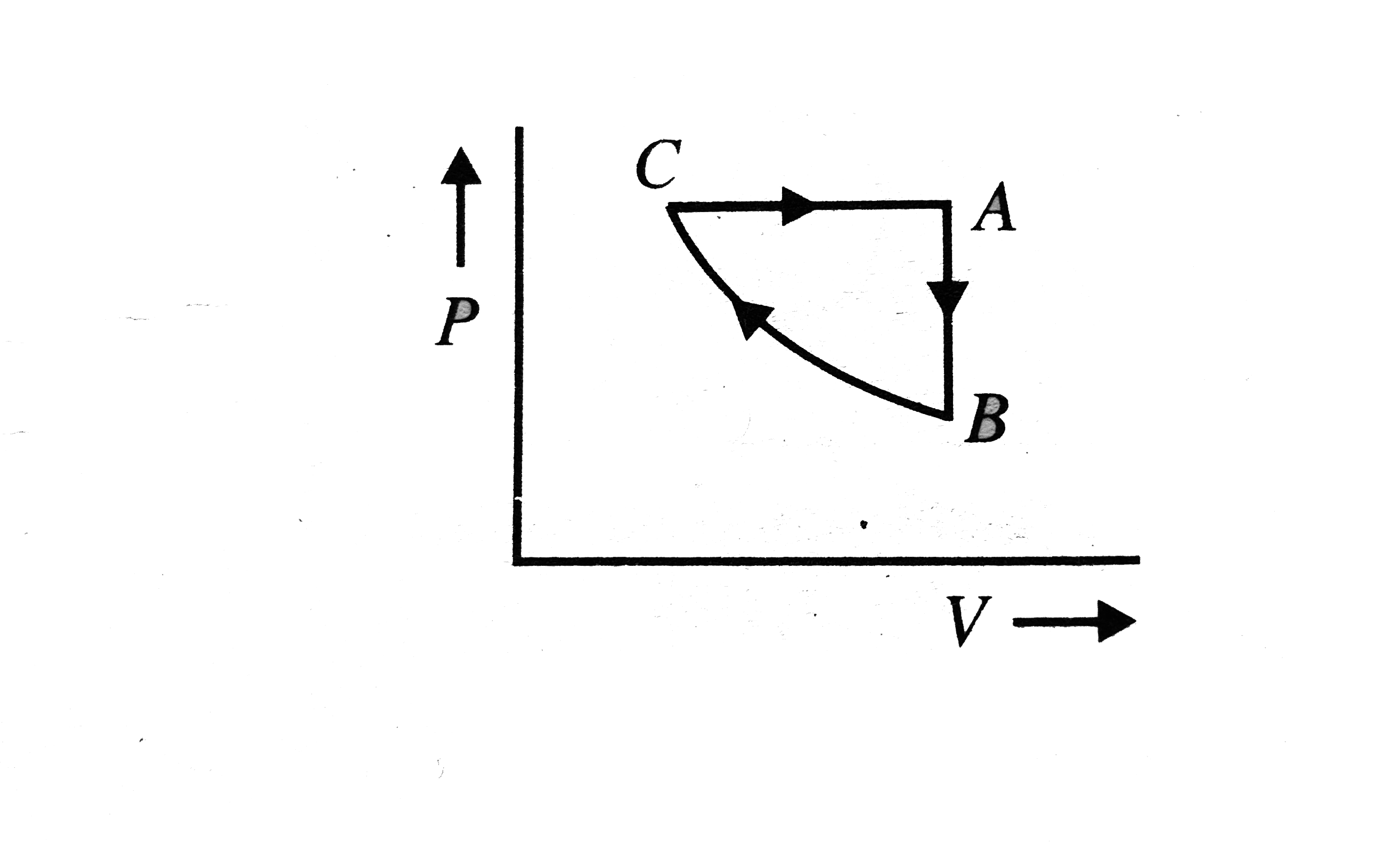
View SolutionAn ideal monoatomic gas undergoes a cyclic process ABCA as shown in the figure. The ratio of heat absorbed during AB to the work done on the gas during BC id
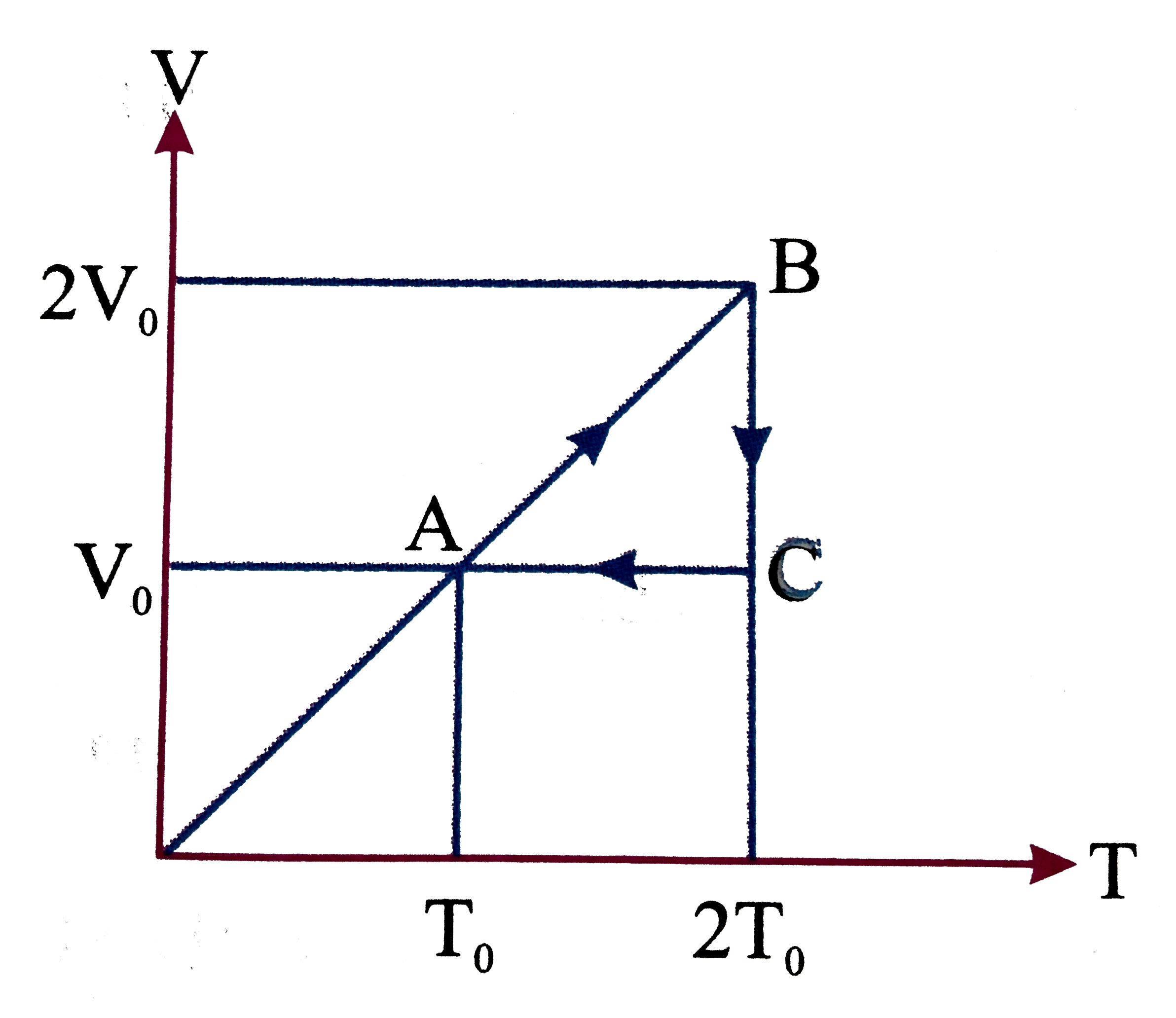
View SolutionA sample of an ideal gas in taken through the cyclic process abca in the given figure. It absorbs 50 J of heat during the parth ab, no heat during bc and rejects 70J of heat during ca, 40 J of work is done on the gas during the part bc. (a) Find the internal energy of the gas at b adn c if it is 1500 J at a. ltbr> (b) Calculate the work done by the gas during the part ca.
View SolutionIn figure, a sample of an ideal gas is taken through the cyclic process abca. 800J of work is done by the gas during process ab. If gas absorb no heat in process ab, rejects 100J of heat during bc and absord 500J of heat during process ca. Then (a) find the internal energy of the gas at b and c if its is 1000J at a (b). Also calculate the work by the gas during the part bc,

View SolutionAn ideal gas follows a cyclic process as shown in figure. Internal energy of gas at point A is 10 J while at B is 70 J. the heat absorbed by gas in BC is 120 J.
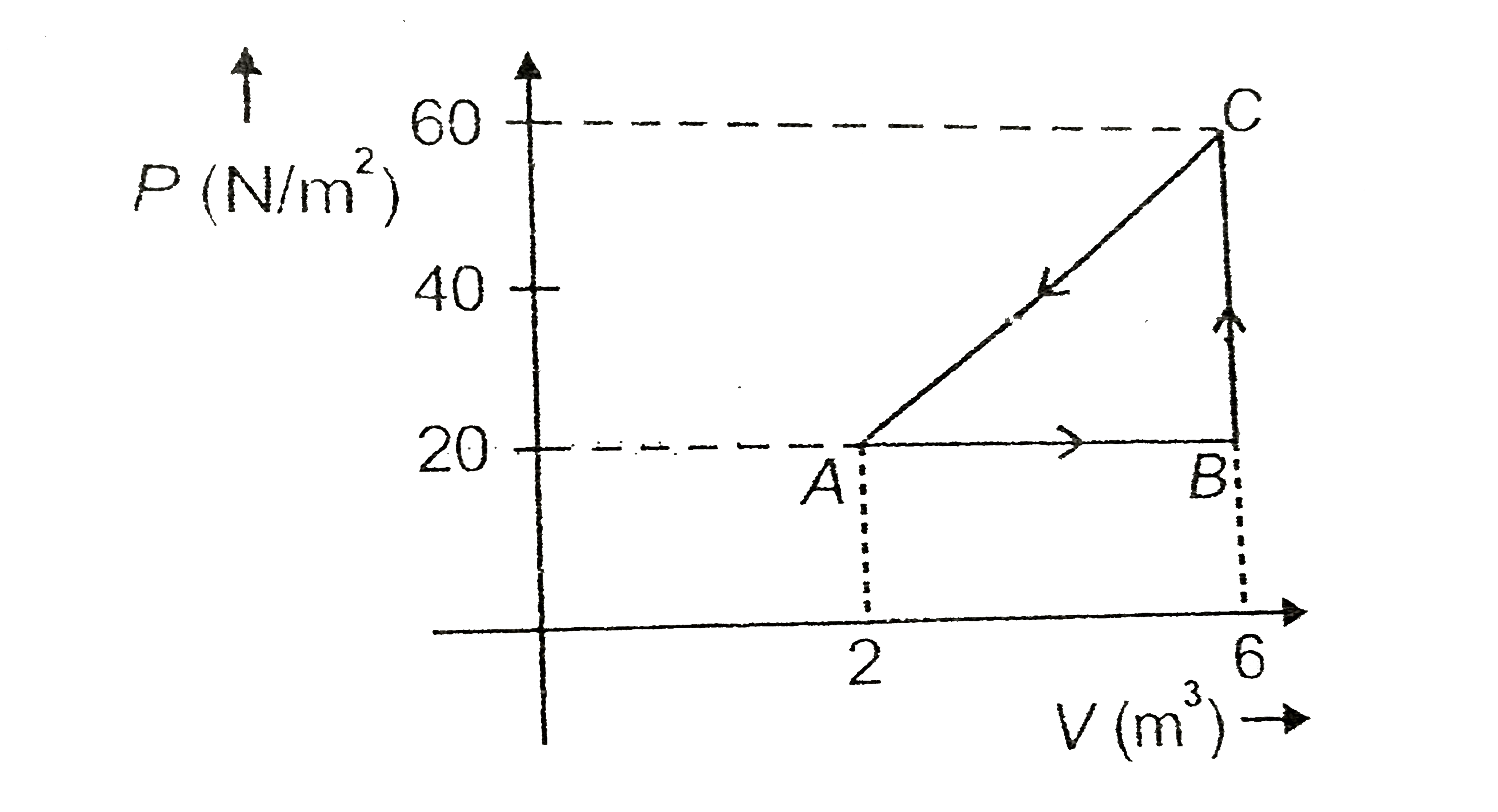
(a) How much heat is absorbed in process AB?
(b) Find heat energy rejected or absorbed by gas in process CA.
View Solutionएक आदर्श गैस को, चित्र में दर्शाये गये अनुसार चक्रीय प्रक्रम abca से गुजारा जाता है। ca पथ के अनुदिश गैस की आन्तरिक ऊर्जा में परिवर्तन -180 J है। ab पथ के अनुदिश, गैस 250 J ऊष्मा अवशोषित करती है तथा bc पथ के अनुदिश, गैस 60 J ऊष्मा अवशोषित करती है तो. पथ abc के अनुदिश, गैस द्वारा किया गया कार्य है
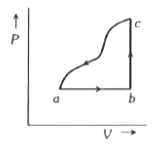
View Solutionएक आदर्श गैस को, चित्र में दर्शाये गये अनुसार चक्रीय प्रक्रम abca से गुजारा जाता है। ca पथ के अनुदिश गैस की आन्तरिक ऊर्जा में परिवर्तन -180 J है। ab पथ के अनुदिश, गैस 250 J ऊष्मा अवशोषित करती है तथा bc पथ के अनुदिश, गैस 60 J ऊष्मा अवशोषित करती है तो. पथ abc के अनुदिश, गैस द्वारा किया गया कार्य है

View SolutionConsider the cyclic process ABCA, shown in fig, performed on a sample of 2.0 mol if an ideal gas. A total of 1200 J if heat is withdrawn from the sample in the process. Find the work done by the gas during the part BC.

View SolutionAn ideal gas is taken through a process as shown in the figure. It absorbs 100 J of energy during the process AB. No heat is absorbed or rejected along the process BC and rejected 140 Jduring the process CA. During the process BC, 60 J of work is done on the gas. Internal energy of the gas at A is 2000 J. The internal energy at C is
View Solution
